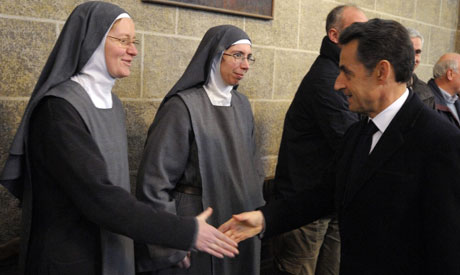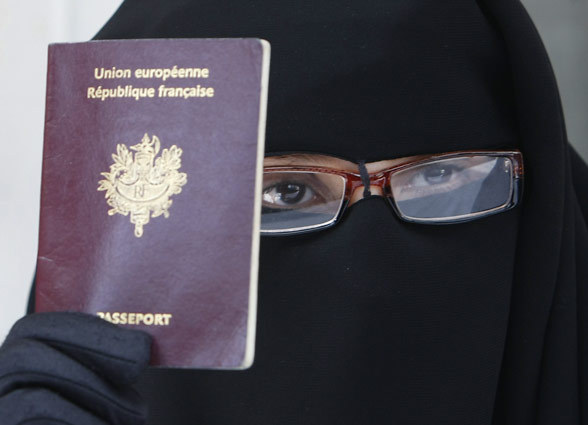 President Nicolas Sarkozy, leader of an officially secular republic, hailed France’s Christian heritage Thursday as his right-wing party questioned Islam’s role in society.
President Nicolas Sarkozy, leader of an officially secular republic, hailed France’s Christian heritage Thursday as his right-wing party questioned Islam’s role in society.
Sarkozy’s speech in the Catholic pilgrimage town of Puy-en-Velay came one month before France is due to formally begin a ban on the wearing of full-face Muslim veils in public places and amid controversy over religious identity.
Critics of the president and his majority party, the centre-right UMP, have argued against stirring dangerous prejudices and endangering France’s strictly secular identity by calling for a national debate on religion.
But Sarkzoy, who faces a tough challenge from a rejuvenated far-right in next year’s presidential election, remains undeterred, and reached out to Catholic voters in a way designed to annoy his left-wing critics.
“Christianity left us a magnificent heritage of civilisation. As a secular president, I can say that,” he said, speaking in a town that for centuries has been a way station for pilgrims heading to Santiago de Compostela. “This heritage comes with obligations, this heritage is a privilege, but it presents us above all with a duty: It obliges us to pass it on to future generations, and we should embrace it without doubt or shame,” he said.
Sarkozy’s renewed celebration of Christianity came as the leadership of his UMP party was trying to start a national debate on religious practice, and in particular on the place of France’s more than five million Muslims.
Last year’s debate on national identity raised political tension to boiling point and saw France widely criticised, particularly as it came as Sarkozy targeted foreign-born Roma Gypsies for expulsion. Opponents accused the leader, who is struggling in the polls, of stirring racial divisions in a bid to win votes from the far-right National Front, now gaining ground under its founder Jean-Marie Le Pen’s daughter, Marine.
Sarkozy appears to be returning to the fray. Last month he declared that multiculturalism had been a “failure” and said that he wanted to see develop a “French Islam, not an Islam in France.” Now, UMP secretary general Jean-Francois Cope has called a meeting on April 5 to discuss religious practice “particularly that of the Muslim sect”.
On April 11, a law banning face-covering garments like the niqab or the burqa will come into effect, forcing the tiny minority of French Muslim women that wear them to remove them or face arrest and fines.
AFP, 3 March 2011
See also “Sarkozy’s Islam debate opens rift in French ruling party”, FaithWorld, 4 March 2011

 President Nicolas Sarkozy, leader of an officially secular republic, hailed France’s Christian heritage Thursday as his right-wing party questioned Islam’s role in society.
President Nicolas Sarkozy, leader of an officially secular republic, hailed France’s Christian heritage Thursday as his right-wing party questioned Islam’s role in society. From Saudi tourists window-shopping on the Champs-Élysées to Muslim women in a departure lounge at Charles de Gaulle airport or the few young French converts on suburban estates, any woman who steps outside in France wearing a veil that covers her face will be breaking the law from next month.
From Saudi tourists window-shopping on the Champs-Élysées to Muslim women in a departure lounge at Charles de Gaulle airport or the few young French converts on suburban estates, any woman who steps outside in France wearing a veil that covers her face will be breaking the law from next month.